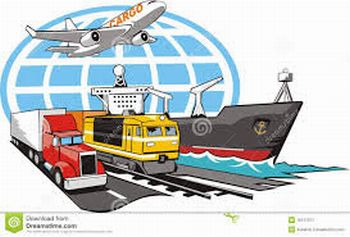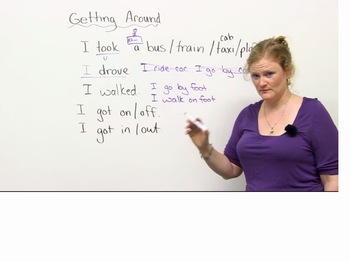16/09/2014
Eliana Dias e Lazuíta Goretti de Oliveira
| Modalidade / Nível de Ensino | Componente Curricular | Tema |
|---|---|---|
| Ensino Médio | Língua Estrangeira | Competência pluricultural: língua como meio de acesso às manifestações culturais |
| Ensino Fundamental Final | Língua Estrangeira | Textos orais com marcas entonacionais e pronúncia |
| Ensino Médio | Língua Estrangeira | Compreensão leitora |
| Ensino Médio | Língua Estrangeira | Produção oral |
| Ensino Médio | Língua Estrangeira | Produção escrita |
| Ensino Fundamental Final | Língua Estrangeira | Grau de formalidade na escrita e na fala |
| Ensino Médio | Língua Estrangeira | Compreensão oral |
| Ensino Fundamental Final | Língua Estrangeira | Organização textual |
| Ensino Fundamental Final | Língua Estrangeira | Aspectos morfológicos, sintáticos e fonológicos |
O que o aluno poderá aprender com esta aula
- ampliar o vocabulário relacionado a transportes;
- usar verbos e expressões relacionados a meio de transportes
Duração das atividades
Conhecimentos prévios trabalhados pelo professor com o aluno
- Não há necessidade de conhecimento prévio, por se tratar de conteúdo de nível básico
Estratégias e recursos da aula
- recursos multimídia;
- imagens veiculadas na internet;
- discussões orais;
- vídeo;
- atividades xerocopiadas;
- atividades online;
- atividades de compreensão auditiva;
- atividades de compreensão escrita
TRANSPORTATION

free-stock-photography-sign-transportation-cargo-image18117617%3B1300%3B879 (acesso em 30.08.2014)
MÓDULO 1
Atividade 1
Proponha aos alunos a discussão das seguintes questões, que servirão como introdução para a temática da aula. Atente-se para o vocabulário que aparecerá durante a discussão e, se for o caso, escreva-o no quadro. Oportunize a participação de todos os alunos na discussão. Se o grupo de alunos for grande, distribua de duas a três perguntas para cada dupla ou trio de alunos.
Conversation Questions
Fonte adaptada: http://www.englishwithjo.com/english-conversation-transportation/ (acesso em 30.08.2014)
Atividade 2
Reproduza o vídeo disponível em: http://www.engvid.com/transportation-vocabulary-phrasal-verbs/ (acesso em 31.08.2014) e peça para que os alunos tomem nota das palavras ou expressões que aparecem no vídeo e que se relaciona à temática da aula. O vídeo deverá ser reproduzido mais de uma vez, dependendo do entendimento dos alunos. Pause a cada momento que observar a dificuldade dos alunos em não entender o seu conteúdo.

Imagem do vídeo
Atividade 3
Projete o seguinte texto, com informações sobre verbos e expressões utilizados com transporte. Peça para que os alunos criem as suas próprias frases com os verbos e expressões apresentados no texto. Entregue uma cópia do texto para cada aluno, para que esse material componha o seu arquivo pessoal e para futuras consultas.
Verbs and Transport
Phrasal Verbs
Useful means of transport expressions
| traveling by ... | |||
|---|---|---|---|
| rail | bus / coach | air | sea |
| station train catch / get on get off platform passenger train journey depart / leave arrive engine engine driver corridor / aisle |
bus terminal bus catch / get on / board get off departure gate coach / bus journey depart / leave arrive driver's seat bus driver aisle |
airport aircraft get on / board get off / disembark departure gate passenger jet / airplane flight take off land cockpit pilot aisle |
port ship embark disembark quay / dock liner voyage sail dock bridge captain gangway |
Fontes adaptadas: http://www.englishwithjo.com/english-conversation-transportation/ e http://www.myenglishpages.com/site_php_files/vocabulary-lesson-means-of-travel.php#.VAPKLsVdUeh (acessos em 31.08.2014)
MÓDULO 2
Atividade 4
Disponibilize o áudio Transport, do sítio: http://www.englishwithjo.com/wp-content/uploads/2012/05/Transport.mp3 (acesso em 31.08.2014), cujo conteúdo se refere a 6 pessoas opinando sobre os meios de transporte de sua cidade. Antes de ouvir, leia com os alunos as seguintes questões, que deverão ser respondidas durante a escuta do áudio.
a) Does Ruth have a good transportation in her village? Does she see any problem because of it? Why (not)?
b) Where does Akane live? Does it have a good transportation system? What does she mention about Toronto?
c) According to Jeyong, does Korea have a good transportation? Why (not)? Does he mention any problem concerning to the traffic in his city? If so, what is it?
d) Where does Naomi live? DSoes it have a good transportation? Why (not)? How does she travel?
e) Doea Ruth, from Ireland, live in the capital of her country? Accfording to her, what are the problems with the buses that run into Dublin?
f) According to Todd, what is the best thing about the transportation system in San Francisco? What are the means of transportation mentioned by him?
Reproduza o áudio mais de uma vez, possibilitando o entendimento do seu conteúdo.
Atividade 5
Projete o audioscript do áudio anterior, e peça para que os alunos acompanhem e confiram as respostas das perguntas da atividade anterior. Leia os depoimentos de cada personagem mais de uma vez, oportunizando a participação de todos os alunos.
Cada aluno deverá se responsabilizar pela leitura da resposta das perguntas anteriores. Peça para que escrevam as respostas no quadro, facilitando a visualização e a correção pelos próprios alunos.
TRANSPORT TRANSCRIPT
Ruth, England
Good transportation? Not really because I'm from a small village but then if you actually go into the town itself, then things aren't too bad. There's quite a good bus system and you can get there easily on the train. We don't have a tram or anything like that but we don't need one. It's not very big anyways so we have enough transportation for all of our needs.
Akane, Canada
Does your hometown have a good transportation? Well, my hometown is Toronto and I would say that it does have a good transportation system. The highway system is quite extensive and there are buses and subway systems and long distance trains throughout. It may not be as convenient as some other countries like England or Japan, but I do think Toronto has the best transportation system in Canada.
Jeyong, South Korea
I'm from Seoul, Korea and "Yes" we have a good transportation because we have a lot of buses and we have a very convenient subway which almost goes around places around Seoul area, and outside of Seoul, so basically you can reach any place by riding the subway, and buses, even though there's a big traffic, still I think it's very comfortable.
Naomi, Australia
There's actually not very good transportation in my hometown because it's quite rural. You definitely need your own car to get around. I have a car in my hometown to get me around because actually it's on top of a mountain so there's no trains and there's only an occasional bus which is very expensive to use.
Ruth, Ireland
The transport in my hometown isn't too bad. I live quite near to the capital so there is a train that runs in and out from there. There are buses as well that run into Dublin city but sometimes they can be late or delayed.
Todd, United States
Yeah, San Francisco has a pretty good transportation system. The best thing about it, it's really cheap. You can go anywhere in the city for 1 dollar because once you buy a ticket for one dollar you get three transfers, so you can transfer from a bus to another bus, or a bus to the subway, so it's really efficient. Also we have the cable cars and there's pretty cool.
Fonte: http://www.englishwithjo.com/english-conversation-transportation/ (acesso em 31.08.2014)
Atividade 6
| check in |
come back |
get in |
get on |
put (someone) up |
see (someone) off |
take off |
touch down |
stop off |
set off |
| stop off
|
come back |
get off |
get on |
put (someone) up
|
set off |
turn back |
put on |
come across |
take off |
| car
|
bus |
taxi |
bicycle |
| van |
train |
airplane |
boat |
| ambulance |
fire truck |
truck |
|
Recursos Complementares
Para outras atividades sobre o tema da aula, acesse:
http://www.ihbristol.com/free-english-exercises/test/esol-smc-phrasal-verbs-transport
http://www.passporttoenglish.com/Beginning-English/Lesson11/Vocabulary.html
http://www.elcivics.com/lifeskills/rollover-accident.pdf
(acessos de todos os links sugeridos em 31.08.2014)
Avaliação
- Professor, todas as atividades da aula deverão ser avaliadas pelo professor, que deverá ficar atento a motivação e participação dos alunos durante a aula.
- Para uma avaliação formal, os alunos deverão criar diálogos, cujo tema esteja relacionado a meio de transportes. O diálogo deverá ser apresentado ao grupo e uma cópia escrita deverá ser entregue ao professor para que ele possa emitir um feedback.
Sem estrelas 0 classificações
- Cinco estrelas 0/0 - 0%
- Quatro estrelas 0/0 - 0%
- Três estrelas 0/0 - 0%
- Duas estrelas 0/0 - 0%
- Uma estrela 0/0 - 0%
Denuncie opiniões ou materiais indevidos!
- Sugestão de aula
- Aulas
- Coleções de aulas
- Criar aula
- Criar individual
- Criar em equipe
- Gerenciar equipes
- Minhas aulas
- Orientações
- Criando equipes
- Dicas para a produção de aulas
- Reflexões pedagógicas
- Utilizando a ferramenta
- Artigo: portal educacional
- Estatísticas de uso do Portal
- Estatísticas de aulas
- Estatísticas de recursos
- Estatísticas de visitas
- Recursos utilizados em aulas
- Reflexões pedagógicas
- Informações de cursos
- Cursos
- e-Proinfo
- Materiais de cursos
- Materiais de estudo
- Artigos e publicações
- Assuntos relevantes
- Avaliações
- Ciência do cotidiano
- Destaques internacionais
- Dicas práticas
- Educação profissional e tecnológica
- Entrevistas
- Estratégias pedagógicas
- Inovações tecnológicas
- Materiais de cursos
- Materiais de evento
- Orientações e diretrizes
- Parâmetros e referencias
- Programas em vídeos
- Tutoriais
- TVescola
- Ferramentas do portal
- Fórum
- Portal do Youtube
- Compartilhando apresentação
- Ferramentas pela internet
- Blog
- Compartilhe vídeos
- Comunicação on-line
- Crie e compartilhe apresentações
- Edite e compartilhe fotos
- Escrita colaborativa
- Junte-se a uma comunicade
- Lista de discussão
- Organize e compartilhe favoritos
- Podcast
- Rádio/TVs Universitárias e outros
- Redes Sociais
- Robô Ed
PLATAFORMA FREIRE
- Bibliotecas
- Capacitação Proinfo Integrado
- Cultura
- Dicionários, tradutores e enciclopédias
- Educação inclusiva
- Geoprocessamentos
- Inclusão digital
- Infográficos
- Jogos educativos
- Jornais
- Museus
- Observatórios e planetários
- Organizações governamentais
- Plataformas educacionais
- Portais educacionais e outros
- Portal MEC
- Prêmio professores do Brasil
- Produções de professores
- Projetos de escolas
- Projetos inovadores
- Projetos sociais e educacionais
- Rádio escola
- Recursos digitais
- Revistas
- Sites de busca
- Sites temáticos do portal e TVescola
- Softwares de edição e outros
- Softwares educacionais
- Um computador por aluno

- Ryan Oksenhorn
- Ryan Snow
- Sergio Caldara
- Shane Miler
- Shane Herzog
- Sotirios Papavasilopoulos
- Stephen JB Thomas
- Tarah
- Valera Nazarov
- ZbigniewMa K Flakus


